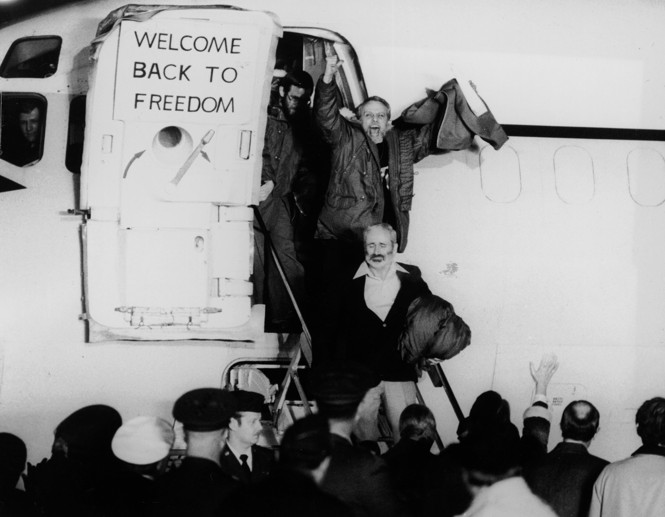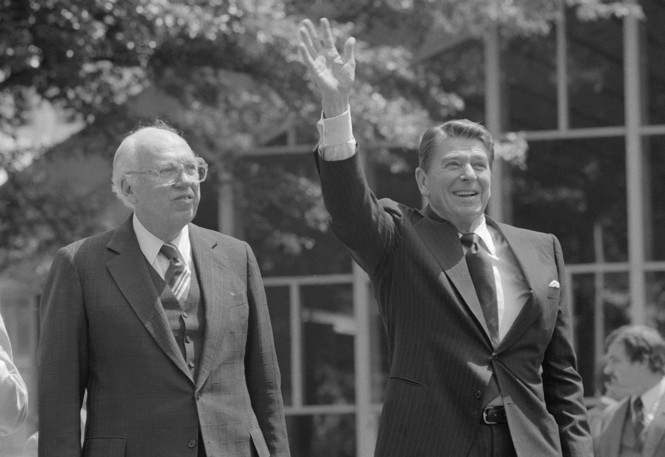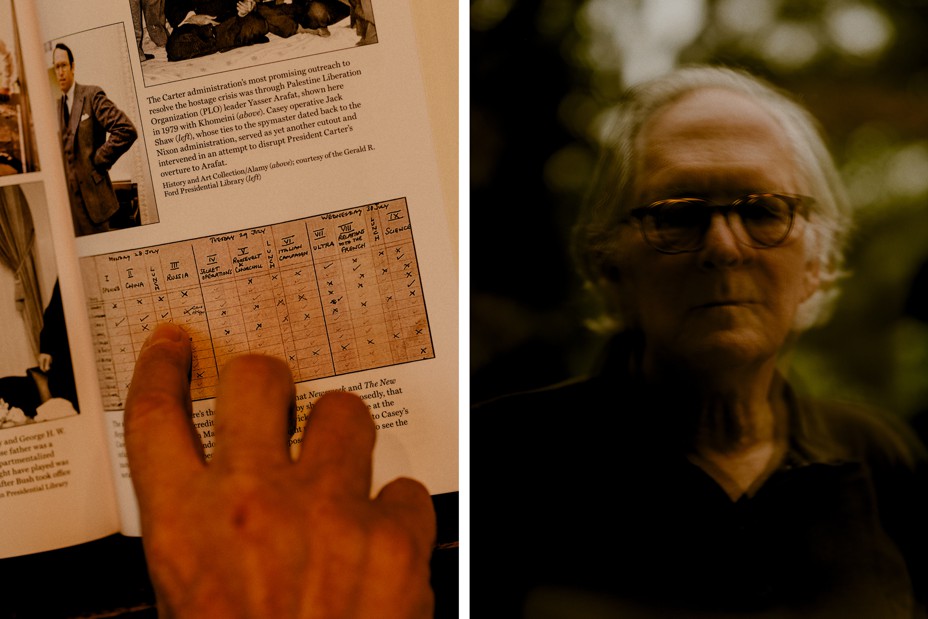The Journalist Who Cried Treason
The obsession that would overtake Craig Unger’s life, get him labeled a member of the “tinfoil-hat brigade,” and nearly destroy his career as an investigative reporter took root on an April morning in 1991. Scanning The New York Times and drinking his coffee, he came upon an op-ed detailing a treasonous plot that had sabotaged Jimmy Carter’s reelection efforts a decade earlier—a plot that would become known, somewhat ironically, as the October surprise.
Gary Sick, a former Iran specialist on the National Security Council, was alleging that during the 1980 presidential campaign, while more than 50 Americans were being held hostage in Iran, Ronald Reagan’s team made a backroom arms deal with the new Islamic Republic to delay the hostages’ release until after the election. Carter, bedeviled by the international fiasco, would be denied the narrative he needed to save his sinking chances—an October surprise, that is—and Reagan could announce the Americans’ freedom just after he was sworn in (which he went on to do).
This story was “literally unimaginable,” Unger writes in his new book, Den of Spies—a crime of the highest order. He was hooked.
 American hostages depart an airplane on their return from Iran. Their release was announced minutes after President Ronald Reagan’s inauguration. (Getty)
American hostages depart an airplane on their return from Iran. Their release was announced minutes after President Ronald Reagan’s inauguration. (Getty)
Speaking with me about the October surprise from a leather booth at a Greenwich Village tavern more than three decades later, Unger, now 75, lit up. Uncovering exactly how Republican operatives had improbably and secretly worked out an agreement with Ayatollah Khomeini would give him a chance to be Woodward and Bernstein, or Seymour Hersh—journalistic heroes whose crusading investigations he revered. “For anyone who had missed out on Watergate, the October Surprise seemed to offer another shot,” he writes in Den of Spies. But it would not be Unger’s Watergate. It would be his undoing. Within a year, the story was downgraded to a hoax and Unger was both out of a job at Newsweek and being sued for $10 million. He had become, he writes, “toxic.”
Now, though, on the strength of newer and more credible evidence, he is returning to the story. Den of Spies is not just a summation of his years of steady research into the plot, and not even just a play for redemption; it’s a referendum of sorts on a style of journalism that once ruled the day.
Unger is what anyone would call an old-school reporter. His instincts were formed during the Watergate era, when the public’s reflexive trust in government was high (somewhere near 70 percent before Richard Nixon took office, as opposed to about 20 percent today) and journalists began fashioning themselves as adversaries with the presumption that the worst abuses of power were happening behind closed doors. Their role was to break Americans’ credulity—and they did. When I met Unger in mid-September, a second apparent attempt on Donald Trump’s life had just occurred. I asked him for his first thought. “Cui bono?” he said. “Who benefits from it?” He wasn’t saying it had been a false-flag operation. But he definitely started from the premise that it might have been.
[James Fallows: An unlucky president, and a lucky man]
This is how Unger thinks. His previous two books tried to cement the idea that Donald Trump is an asset of Vladimir Putin. Unger’s modus operandi is to point to many different dots and then wonder at how they might connect, even when he can’t connect them himself or when those dots are being served up by deeply unreliable sources, such as a former KGB agent. Suspicion is what matters. He traffics in doubt. One negative review of his book American Kompromat in The Guardian described it as “dozens and dozens of wild stories and salacious accusations, almost all ‘too good to check,’ in the parlance of old-time journalists.”
When it comes to the October surprise, Unger couldn’t give up on it, even after it rapidly moved from news to apparent fake news. A friend called the story his “white whale” (“I did not need to be reminded that things had ended badly for Captain Ahab,” Unger writes). Without any publication to support his continued pursuit of the story, he traveled to Paris and Tehran on his own to interview sources, made his way through thousands of pages of documents and sales receipts, combed through it all year after year. His book contains all of this evidence, published during another consequential October—and landing, as a sort of personal gift, on Carter’s 100th birthday.
But the world in which Unger is now laying out his proof is very different from the America of 1980, or even of 1991, when his fixation began. Trust in leaders has eroded so completely that no one is moved anymore by the revelations of secrets, lies, or treachery—if you want to hear about stolen elections, just tune in to any Trump rally. Definitive evidence will now have to compete with loopy conspiracy theories. This is unfortunate, because the once-debunked October surprise has shifted over the same decades into the realm of high plausibility (though nothing close to agreed-upon history). And Unger and a few other reporters of his generation are responsible. They think that what actually happened still matters.
“I don’t like to be wrong,” Unger told me, glaring through tortoiseshell glasses. “And worse, I don’t like to be called wrong when I’m right.”
The alleged linchpin of the October surprise was William Casey, Reagan’s campaign manager through most of 1980. Casey was the head of secret intelligence for Europe in the Office of Strategic Services, the precursor to the CIA, during World War II, and for the rest of his life maintained a broad network of contacts among the spies and dodgy arms dealers of the world. He was a furtive, mumbly guy; a Manichaean thinker; a Cold Warrior; and, as Unger put it to me, a “dazzlingly brilliant spy.” Casey also seemed to have few scruples about doing what was needed to win. He was accused of having obtained Carter’s debate briefing papers during the 1980 campaign. And once the election was over, Casey was made director of the CIA.
 Then–CIA Director William Casey accompanies President Reagan after signing a bill prohibiting the exposure of CIA agents in 1982. (Bettman / Getty)
Then–CIA Director William Casey accompanies President Reagan after signing a bill prohibiting the exposure of CIA agents in 1982. (Bettman / Getty)
Much of Unger’s book focuses on Casey and the connections and motives that would place him at the center of such a plot, one that would involve breaking an embargo to illegally supply Iran with much-needed spare parts and weapons and using Israel as a conduit to do so (a shocking collaboration to consider today).
After Sick’s 1991 op-ed, every major news publication sought to follow up and investigate. Most of the reporting focused on whether Casey was present at meetings in Madrid at the end of July 1980, when the plan was supposedly hatched. Endless minutiae surrounded this question. Unger showed me a copy of an attendance chart from a conference in London around the end of July, at which Casey was a participant. For the two days he was supposedly in Madrid for the meetings, some of the check marks on the chart indicating his presence in London are in light pencil, not in pen, meaning that he was expected but possibly never showed; did he sneak off to Spain? “Anyone can see this, right?” Unger said, squinting at the chart.
The pieces of this puzzle were that tiny. Or they involved shady characters who said they were at the Madrid meetings or their follow-ups and could attest to the plotting—people such as the brothers Cyrus and Jamshid Hashemi, Iranian businessmen who were acting, Unger alleges, as double agents, pretending to negotiate the hostage release with Carter while working with Casey to stall it for Reagan’s benefit.
Unger, who had been a freelance investigative reporter, was hired by Newsweek, shortly after Esquire published his first article on the October surprise, to join a team dedicated to tracking down the plot. Like Woodward and Bernstein on Watergate, Unger imagined the team would do a series of stories leading, eventually, all the way to the White House. One version of the theory even placed George H. W. Bush, who in 1991 was beginning a reelection campaign, in Paris for the final planning meetings with the Iranians.
 Craig Unger (pictured, right) points to an allegedly incriminating chart in his new book, Den of Spies. (Benedict Evans for The Atlantic)
Craig Unger (pictured, right) points to an allegedly incriminating chart in his new book, Den of Spies. (Benedict Evans for The Atlantic)
And as with Watergate and other conspiracy investigations of various credibility—whether the cigarette industry’s cover-ups or Iraq’s purported weapons of mass destruction—this one relied on a rogues’ gallery of sources. Unger made contact with Ari Ben-Menashe, an arms dealer who claimed to be an intelligence asset for the Israeli Military Intelligence Directorate. Ben-Menashe gave Unger details about the deal and described Casey’s participation. Unger knew that Ben-Menashe was not exactly to be trusted—most Israeli intelligence officials dismissed him as a low-level translator—but Unger considered it worth the risk. “The truth is, people who know most about crimes are criminals,” he told me. “People who know most about espionage are spies. And what you want to do is hear them out and corroborate.” When he tried to do that, Unger said, he was “eviscerated.”
Newsweek was not interested in an incremental Watergate-like build. Instead of Unger’s scoops, they published an article about how Ben-Menashe was a liar who had helped invent the story of the October surprise. Other publications followed. Unger had no time and no outlet to make his case, and he looked like he’d been taken for a ride. These characterizations, he said, “carried the day in terms of creating a critical mass that overwhelmed any data we could surface.”
Unger was soon out at Newsweek. Then he and Esquire were sued for libel by Robert “Bud” McFarlane, Reagan’s national security adviser (the case was thrown out, and McFarlane lost his subsequent appeal). Two congressional investigations looking into the plot were launched in the early 1990s; the House produced a nearly 1,000-page report. Both inquiries concluded that no proof of a conspiracy existed. According to the chair of the House task force, the whole story was the product of sources who were “either wholesale fabricators or were impeached by documentary evidence.”
There was no question that if you pursued this, you were finished,” Unger told me. He tried to rebuild his career, eventually becoming the editor of Boston magazine and then moving back into freelance journalism. He wasn’t exactly the Ahab of the October surprise; that dubious honor belongs to Robert Parry, another old-school type who modeled himself on I. F. Stone, the paragon of independent journalists. It was Parry who kept discovering more clues, including, in 2011, a White House memo that definitively put Casey in Madrid for the July 1980 meetings. Parry died in 2018, leaving behind all of his collected files, including 23 gigabytes of documents. Unger used this material to reopen his own investigation.
In the years since that first op-ed was published, a lot of other testimony and evidence had helped bolster the October-surprise theory, some of it from more reliable sources—notably Abolhassan Bani-Sadr, the president of Iran in 1980, who insisted to anyone who would listen that he had been aware of the plot. Unger went to meet with Bani-Sadr at his home in Versailles, and traveled to Iran in 2014 to see if he could pick up any leads. Among the new material in the book, Unger reveals records he uncovered that appear to document shipments of military equipment from Israel to Iran around the time of the November 1980 election.
[David A. Graham: The Iranian humiliation Trump is trying to avenge]
And just last year, The New York Times published a bombshell report in which Ben Barnes, a prominent Texas politician, revealed a secret he had been keeping for nearly 43 years: In 1980, he traveled throughout the Middle East with John Connally, the former Texas governor, seemingly at the behest of Casey to ask Arab leaders to persuade Iran to delay the hostage release. Barnes said he wanted to add to the record while Carter was still alive. “History needs to know that this happened,” Barnes told the Times.
After this story, The New Republic ran an essay co-authored by Sick, the former National Security Council official; Stuart Eizenstat, Carter’s chief domestic-policy adviser; and two prominent Carter biographers, Kai Bird and Jonathan Alter. Under the headline “It’s All but Settled,” they wrote that they now “believe that it’s time to move past conspiracy theories to hard historical conclusions about the so-called October Surprise.” Like Unger, they had little doubt that Casey “ran a multipronged covert operation to manipulate the 1980 presidential election.”
The odds that Unger will get a renewed hearing for the October surprise—vindicating himself and maybe Carter too—are low. The most recent bizarro episode in the current election might explain why. As anyone following along will recall, the vice-presidential candidate J. D. Vance, seeking to stoke fears about immigrants, helped spread a rumor that Haitians in Springfield, Ohio, were eating residents’ cats and dogs. This was not true—and he knew it. “If I have to create stories so that the American media actually pays attention to the suffering of the American people, then that’s what I’m going to do,” he recently told CNN.
Unger wants to unmask politicians and reveal the truth. But we now live in a country where politicians seem to openly brag about lying, and enough people despise the media so much that they’re willing to believe those lies anyway. We have an epistemic problem that no Woodward or Bernstein could solve. Detailing a nearly half-century-old conspiracy theory, even with Unger’s mass of evidence—the receipts, a videotaped interview with Jamshid Hashemi, those little pencil check marks on an old attendance chart—would read like old news to one half of the country and partisan revisionism to the other half.
 Benedict Evans for The Atlantic
Benedict Evans for The Atlantic
Reporters used to be able to change the “national conversation,” Unger told me. That’s what he was hoping to do, impossible as it seems even to him. Once upon a time, the large newspapers and television networks had, Unger said, “enough authority that a big story would really just land big and change the conversation, and that the organs of government would suddenly click into action to respond with congressional investigations. It is so hard to get that done.”
I wondered, though, in my discussions with Unger, whether reporters like him bore some of the responsibility—whether the kind of skepticism and mistrust that marked his generation of journalists had helped create our post-truth reality. There were moments when he slipped from crusading truth teller to something closer to a conspiracy theorist willing to believe the most outlandish speculations. In the book, for example, with very little proof, he entertains the idea that rogue spies looking to undermine Carter sabotaged the helicopters used in a failed hostage-rescue mission in April 1980, which ended with eight soldiers dying in a crash. I asked Unger whether he really believed this. “Well, I think it is a possibility,” he told me.
It was easier to sympathize with Unger—to see the genuine idealism behind the swagger—when he explained why he couldn’t ever let go of the theory that had so hobbled his career.
He grew up in Dallas; his father was an endocrinologist and his mother owned the biggest independent bookstore in the city. Unger told me about a visit he took to the Dachau concentration camp when he was 14, in 1963. This was instead of a bar mitzvah. While there, he saw Germans atoning for their national sins, not even 20 years after the end of the war, and it stayed with him, that honest reckoning with the past. He told me it made him think of his city’s own Lee Park, named after the Confederate general and defender of slavery, and how shameful it was that so long after the end of the Civil War, Lee’s name was unapologetically honored.
“When my colleagues and I first took on the October Surprise more than thirty years ago, we became actors in a case study of America’s denial of its dark history, its refusal to accept the ugly truth,” Unger writes in his book. After Unger told me the story about his childhood and Lee Park, I looked up the green space and saw that it had been renamed Turtle Creek Park in 2019. Ugly truths, even in America, do occasionally get acknowledged—but it can take longer than one journalist’s lifetime for that to happen.


